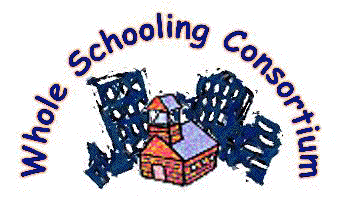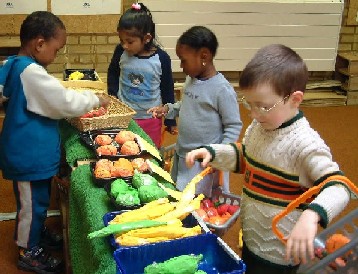

PARTNERING WITH PARENTS AND COMMUNITY
Educators cannot and should not seek to build such a school alone. In a Whole School, educators build genuine collaboration within the school and with families and the community; engage the school in strengthening the community; and provide guidance to engage students, parents, teachers, and others in decision-making and direction of learning & school activities.Links. Publications.
 PARTNERSHIP
FOR LEARNING:
PARTNERSHIP
FOR LEARNING:
Linking local resources of school, families, and community to foster engagement and deepen understanding.
In too many schools serving low income children, substantial tension and poor relationships too often exist between parents and the school. Educators blame parents for their lack of interest in their children. Parents blame teachers for not helping their children learn. Epstein (1994) and others have documented the critical importance of developing partnerships with parents. These same dynamics often play out with parents of students with disabilities across socio-economic groups (Fagano & Weerber, 1994; Hildebrand, Phenice, Gray& Hines, 2000; Taylor, 1997). The lack of instruction at multiple levels, commitment of educators to helping students with emotional and behavioral challenges, the tendency to be critical and refer students to segregated special education programs all contribute to conflict and alienation between educators and parents of students with disabilities. Again, the interests of both NCLB and IDEA have the potential to coincide.
Research has demonstrated the critical importance of developing meaningful partnerships with parents and connecting the school to community resources. Whole Schooling recognizes the need to develop multiple strategies to reach out to parents, bringing them into the life of the school and the classroom in meaningful ways, listening to their input regarding their children, developing collaborative instructional and support strategies. All this begins, of course, with simply welcoming all children into the class. Further partnerships are needed in an effective school that link with community resources, on the one hand, and use the resources and learning activities of the school, on the other hand, to strengthen the local community ((Fagano & Weerber, 1994; Hildebrand, Phenice, Gray& Hines, 2000; Taylor, 1997).
Parents of
children with special needs have typically gone through much with their
children. In traditional schools, these parents receive much
negative
feedback from the school. Their children are rejected and ‘sent
away’ to
special education classes or separate schools.
In a whole school, however, we turn this around by the following actions:
We would NOT see:
We know so much now about how children learn, about how to build a community, how to help children with significant emotional and behavioral challenges. But our challenges and problems are also many. We hope that we will work together to move beyond repression, punishment, rejection, boredom, and isolation to create schools that lead to communities which are empowering, democratic, inclusive, engaging, all based on a sense of community, partnership, support, and care.
Michael Peterson, 2005
Ballen, J. & Moles, O. (1994). Strong families, Strong schools. Washington, D.C.: U.S. Department of Education.
Comer, J. (1997). Waiting for a miracle: Why schools can't solve our problems and how we can. New York: Dutton Books.
Dryfoos, J.G. (1994). Full-service schools: A revolution in health and social services for children, youth, and families. San Francisco: Jossey-Bass Publishers.
Fialka, J. & Mikus, K. (1999). Do you hear what I hear? Parents and professionals working together for children with special needs. Ann Arbor, Michigan: Proctor Publications.
Kretzmann, J. and McKnight, J. (1993) Building communities from the inside out: a path toward finding and mobilizing a community's assets. Chicago, Illinois: Northwestern University, Center for Urban Affairs and Policy Research.
Melaville, A.I., & Blank, M.J. (1993). Together we can: A guide for crafting a profamily system of education and human services. U.S. Department of Education and the U.S. Department of Health and Human Services, U.S. Government Printing Office, Washington, D.C.
Turnbull, A. & Turnbull, R. (1996). Families, professionals, and exceptionality: A special partnership. Columbus, Ohio: Prentice-Hall.